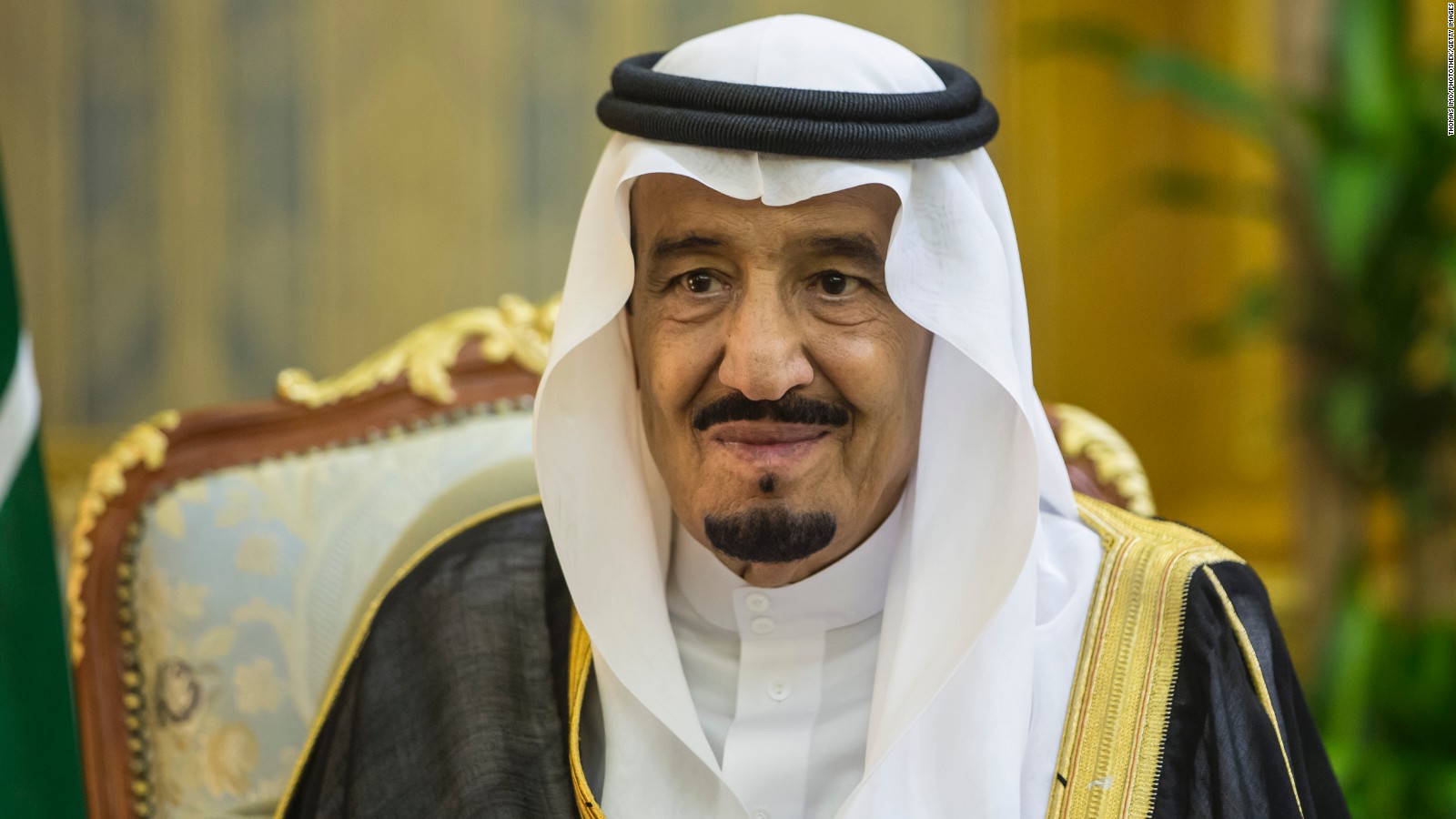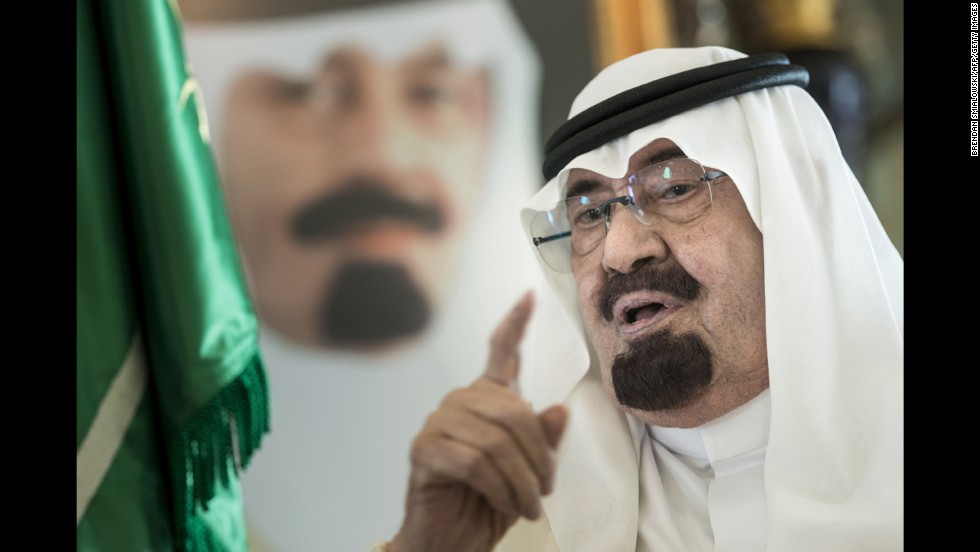Throngs
of mourners gathered in Mecca early Friday just hours after Saudi
Arabia's King Abdullah bin Abdulaziz al Saud died. He was 90.
Prince Salman bin Abdulaziz was appointed as the new king, state television reported.
The announcement of Abdullah's death comes several weeks after the state-run Saudi Press Agency said he was suffering from pneumonia and had been admitted to the hospital.
Services
will be held Friday afternoon at the Imam Turki Bin Abdullah Grand
Mosque in Riyadh, and many world leaders are likely to pay their
respects.
Jordan's King Abdullah cut short his visit to Davos, and is heading to Riyadh, according to a Jordanian government source.
"King
Abdullah's life spanned from before the birth of modern Saudi Arabia
through its emergence as a critical force within the global economy and a
leader among Arab and Islamic nations," U.S. President Barack Obama
said in a statement.
He praised Abdullah's role in sponsoring
the Arab Peace Initiative, which attempts to solve the long-simmering
conflict between Israel and Palestine.
"This
is a sad day. The United States has lost a friend, and the Kingdom of
Saudi Arabia, the Middle East, and the world has lost a revered leader,"
U.S. Secretary of State John Kerry said in a statement. "He was so
proud of the Kingdom's journey, a brave partner in fighting violent
extremism who proved just as important as a proponent of peace."
A cautious reformer
King Abdullah became king of the oil-rich nation, a
key U.S. ally in the Middle East, in August 2005. But he had been
running Saudi Arabia since 1996, after his half-brother King Fahd's
stroke.
In the context of the
kingdom's conservative circles, Abdullah was seen as reformer and often
came up against the more hard-line clerics.

Since
ascending to the throne, Abdullah took steps toward broader freedoms
and invested some of the country's vast oil wealth in large-scale
education and infrastructure projects.
"He was really quite (an)
extraordinary figure. He was probably the most progressive and liberal
minded king of Saudi Arabia since King Faisal, which is a long time ago,
in the early 1970s," CNN's Fareed Zakaria said about Abdullah, who he
described as "much loved."
"I had the
opportunity to meet with him once and what you got a sense of was
somebody who really was determined to move his country forward," Zakaria
said. "It's a conservative country and a conservative society -- and he
kept emphasizing that to me -- but he was very clear in the direction
he wanted to go."
Saudi Arabia's 'reformer' King Abdullah dies
Saudi State TV: King Abdullah dead at 90 04:00
Story highlights
- The funeral for King Abdullah will be held Friday
- Analysts are predicting a smooth political transition
- The next king will be Prince Salman bin Abdulaziz, state TV reports
(CNN)Throngs
of mourners gathered in Mecca early Friday just hours after Saudi
Arabia's King Abdullah bin Abdulaziz al Saud died. He was 90.
Prince Salman bin Abdulaziz was appointed as the new king, state television reported.
The announcement of Abdullah's death comes several weeks after the state-run Saudi Press Agency said he was suffering from pneumonia and had been admitted to the hospital.
Services
will be held Friday afternoon at the Imam Turki Bin Abdullah Grand
Mosque in Riyadh, and many world leaders are likely to pay their
respects.
Jordan's King Abdullah cut short his visit to Davos, and is heading to Riyadh, according to a Jordanian government source.
"King
Abdullah's life spanned from before the birth of modern Saudi Arabia
through its emergence as a critical force within the global economy and a
leader among Arab and Islamic nations," U.S. President Barack Obama
said in a statement.
President Obama reacts to King Abdullah's death 02:01
He
praised Abdullah's role in sponsoring the Arab Peace Initiative, which
attempts to solve the long-simmering conflict between Israel and
Palestine.
"This is a sad day. The
United States has lost a friend, and the Kingdom of Saudi Arabia, the
Middle East, and the world has lost a revered leader," U.S. Secretary of
State John Kerry said in a statement. "He was so proud of the Kingdom's
journey, a brave partner in fighting violent extremism who proved just
as important as a proponent of peace."
A cautious reformer
King Abdullah became king of the oil-rich nation, a
key U.S. ally in the Middle East, in August 2005. But he had been
running Saudi Arabia since 1996, after his half-brother King Fahd's
stroke.
In the context of the
kingdom's conservative circles, Abdullah was seen as reformer and often
came up against the more hard-line clerics.

Since
ascending to the throne, Abdullah took steps toward broader freedoms
and invested some of the country's vast oil wealth in large-scale
education and infrastructure projects.
"He
was really quite (an) extraordinary figure. He was probably the most
progressive and liberal minded king of Saudi Arabia since King Faisal,
which is a long time ago, in the early 1970s," CNN's Fareed Zakaria said
about Abdullah, who he described as "much loved."
"I
had the opportunity to meet with him once and what you got a sense of
was somebody who really was determined to move his country forward,"
Zakaria said. "It's a conservative country and a conservative society --
and he kept emphasizing that to me -- but he was very clear in the
direction he wanted to go."
However,
resistance from conservative factions hindered some of his efforts,
leaving many women in particular disappointed by a lack of progress
toward greater independence.
What's next?
Under
Abdullah's leadership, the country slowly squashed al Qaeda, capturing
or killing its leaders in the kingdom, forcing the remnants underground
and sidelining radical preachers.
It also took a more prominent role in international affairs.
Last year, it became the lead Arab nation in a U.S.-led coalition to eradicate the ultraradical ISIS group in Iraq and Syria.

Analysts
are predicting a smooth political transition despite the many
challenges facing Saudi Arabia, including Iran, the rise of ISIS, the
crisis in Yemen, and the drop in oil prices.
Saudi
Arabia has 16% of the world's known oil reserves, according to the U.S.
Energy Information Administration. The country is widely seen as the
leader of OPEC and has a large influence on energy prices and political
stability in the Middle East.
"Remember,
the last time the price of oil fell like this, the Soviet Union
collapsed," said Zakaria. "That said, the successor is a very competent
man."
He added: "I don't expect any major shift, but it marks a big change, and we'll have to see what the new king is like."
No comments:
Post a Comment